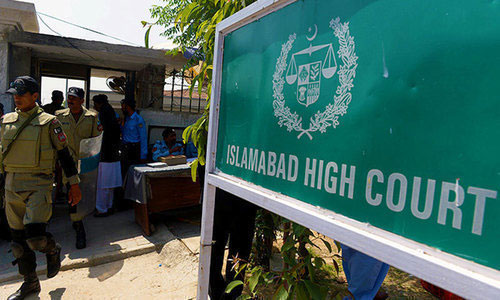The Islamabad High Court on Thursday issued a pre-admission notice to the Election Commission of Pakistan on PTI’s petition challenging the electoral body’s verdict in the party’s prohibited funding case.
A three-member bench comprising IHC Acting Chief Justice Aamer Farooq, Justice Miangul Hassan Aurangzeb and Justice Babar Sattar took up the application.
During the hearing, the IHC summoned the ECP for arguments in the case on August 24. It said that the decision on the admissibility of PTI’s plea would be taken after arguments were presented from both sides. At the outset of the hearing, PTI lawyer Anwar Mansoor told the court that the scrutiny of the party’s accounts began in 2018.
“But the Supreme Court had passed orders [at that time] that accounts of all the political parties should be scrutinised,” he pointed out, contending that the ECP had “targeted” PTI and “exceeded its powers and scope”.
At this, Justice Farooq asked if the electoral body had conducted an inquiry into the complaints. Mansoor replied that only the details of individuals claiming to be party members were investigated. Continuing his arguments, the PTI lawyer said that the law only allowed ECP to confiscate prohibited funding received by a party. “It has no other powers apart from that.”
He said that the Political Parties Ordinance, 2002, gave political parties a chance to make amends. “According to Rule 10, the party will be given a chance to correct itself and will be allowed to resubmit its papers.”
Subsequently, Justice Farooq asked: “Which law was applied by the ECP [in the funding case]?” Mansoor replied that it had passed the verdict in the prohibited funding case under the PPO. “However, the scrutiny committee had relied on a different law,” he added.
“But how is it possible?” the IHC acting chief justice asked, to which Mansoor said that he could show this to the court.
The PTI lawyer also said that the ECP included unverified details in the case giving examples of the funding received from Romita Shetty and Arif Naqvi. “This way they showed PTI’s own agents as foreign firms,” he argued.
At this, Justice Aurangzeb said that the lawyer was not keeping the case “at one point” and asked whether the funds were sent to the party by multinational companies.
“No. We have the definition of multinational companies present here,” Mansoor replied and then proceeded to read the definitions out loud. Subsequently, the judge asked him if all these things were told to the ECP.










